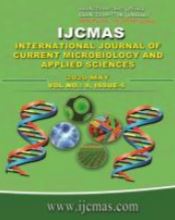


 National Academy of Agricultural Sciences (NAAS)
National Academy of Agricultural Sciences (NAAS)

|
PRINT ISSN : 2319-7692
Online ISSN : 2319-7706 Issues : 12 per year Publisher : Excellent Publishers Email : editorijcmas@gmail.com / submit@ijcmas.com Editor-in-chief: Dr.M.Prakash Index Copernicus ICV 2018: 95.39 NAAS RATING 2020: 5.38 |
Aquaponics (AP) is defined as the combination of hydroponics and recirculating aquaculture system & is also played a major role in minimizing the negative environmental impacts resulted from intensive fish farming and crop production. It is totally an environmental-friendly production system due to its full recycling potentiality of waste and nutrients. It is a symbiotic integration of two type of food production disciplines within a closed recirculating system i.e. (i) aquaculture (the practice of fish farming); and (ii) hydroponics, the cultivation of plants in water without soil. Depending on the specific conditions, aquaponics can provide a sustainable food source in low and medium income countries, especially where climate conditions are favorable. Aquaponics has beneficial reductions for some environmental impacts associated with food production. Besides this it is one of the complex system though it deals with three different concepts of fish, plant and microorganism as a whole. So the water quality management aspects are taken into consideration on priority basis particularly the pH, Nutrient & phosphorous content of water during this type of culture practice. Otherwise the variations of these parameters may lead to mass killing of fish, plant and beneficial microbes together. Moreover certain key economic points must be given due attention to make Aquaponics system sustainable & profitable i.e the overall investment cost, Annual operational cost & Realistic estimates of market prices etc. Considering the food production & population consumption pattern of our country, It is needed to develop the innovative aquaculture techniques in a sustainable manner. In this context, the aquaponics system played a major role towards environmental, social and financial sustainability which leads to overall sustainability.
 |
 |
 |
 |
 |